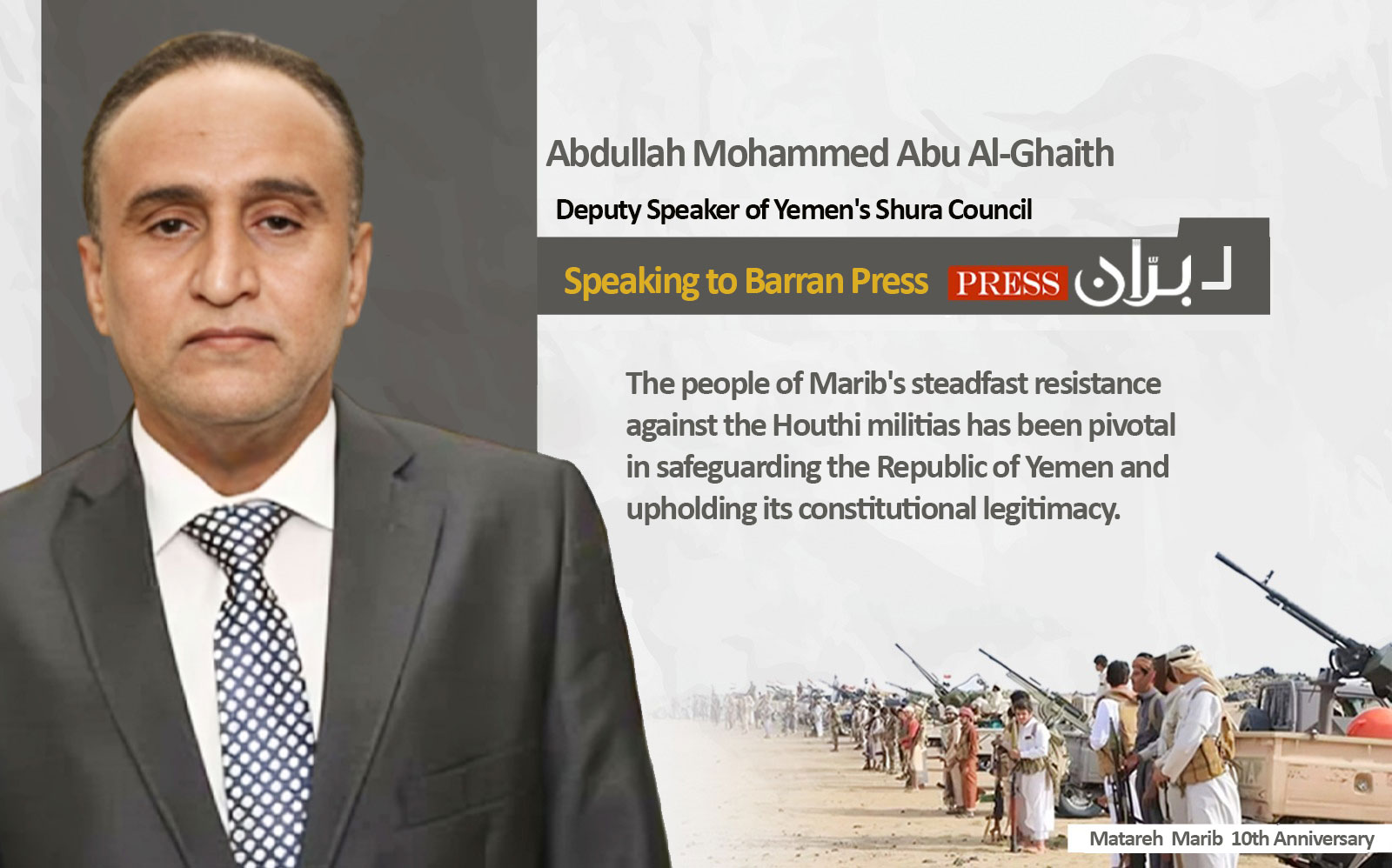
Barran Press
Deputy Speaker of Yemen's Shura Council, Abdullah Mohammed Abu Al-Ghaith, has praised the role of Marib Governorate (northeastern Yemen) in confronting the Houthi coup and their attempt to seize control of the oil-rich province in 2014.
In an interview with "Barran Press" coinciding with the tenth anniversary of the Marib encampments, Abu Al-Ghaith stated, "Marib is not just a geographical location, but represents Yemen's history and cultural heritage. It stands as a formidable barrier and a solid fortress protecting the state and the republic."
On September 18, 2014, tribes in Marib established armed popular camps known as "Al-Matareh" in the regions of "Nakhlat and Al-Saheel" northwest of the governorate, and later in the western and southern outskirts. This was done to counter the escalating Houthi offensive aimed at seizing control of the province by force.
This move, a traditional tribal custom for confronting threats, came after two months of Houthi mobilization and attacks on tribesmen in the border areas with the governorates of Al-Jawf and Sana'a. This followed their capture of the city of Amran in July 2014 and their advance towards the capital Sana'a, culminating in its fall on September 21, 2014.
Marking this anniversary, Abu Al-Ghaith said that the local authorities, military, security, civilian institutions, tribes, and political parties in Marib "formed an impenetrable barrier against these militias, crushing their arrogance and pride, shattering their ambitions and sick desires to seize Marib and beyond."
The prominent Yemeni politician emphasized the importance of "drawing lessons, insights, and wisdom from Marib and its stance in uniting ranks, forgetting differences and disparities, and prioritizing the national interest."
The Deputy Speaker of the Yemeni Shura Council urged academics to dedicate their research papers and investigative studies to enrich the great experience of Marib in preserving the state, its entity, and its center. He also called for incorporating this experience into educational curricula.
He further urged all tribes, parties, components, national and community forces to learn from Marib's experience in maintaining national unity, upholding constitutional legitimacy, and supporting efforts to restore the state and its institutions.
The interview:
As the tenth anniversary of Marib's mobilization against the Houthi militia's coup approaches, it is crucial to evaluate the performance of the local authority and its security and military apparatus in confronting Houthi aggression. What role have they played in coordinating political and community efforts to tackle this existential threat and safeguard vital state institutions?
The local authority in Marib took a historic stance by declaring a state of emergency against the Houthi militias. This call united local, military, security, civil, tribal, and political entities in a demonstration of courage and resilience. Together, they formed a formidable barrier against the militias, breaking their arrogance and thwarting their ambitions to seize Marib and beyond.
Thanks to the efforts of Sheikh Major General Sultan bin Ali al-Arada, the Deputy Chairman of the Presidential Leadership Council, alongside the people of Marib and their tribes, a significant national role was played in halting the Houthi advance. This effort was crucial in resisting the Iranian-backed project and preserving the state's institutions, its security, and vital resources such as oil, gas, and water. They deserve our utmost respect and recognition.
History will remember this role as a shining example, and the Yemeni people take pride in their bravery and sacrifices.
What does Marib's stance represent at the provincial level, for the Yemeni state, the republican system, and national identity?
Marib, with its diverse political, social, and tribal factions, demonstrated exemplary and honorable positions. They became a beacon of hope in the fight against Houthi expansion after the militia seized the capital and other governorates. The resistance mounted by Marib's citizens was pivotal in preserving the Yemeni republic and its constitutional legitimacy.
Initially, Marib stood alone as the first stronghold against the militias. This legendary resilience played a significant role in rallying all Yemenis under the banner of the Yemeni state and its constitutional institutions against the Houthi group.
As a result, freedom fighters from across Yemen, including tribal leaders and members of the national army and security forces, reorganized to confront the Houthi militias, dismantling their sinister aspirations alongside Marib's brave defenders.
Amid this critical battle against the Houthis, the local authority in Marib fought on multiple fronts: military, social, developmental, educational, and healthcare. One hand held the weapon while the other focused on education, health, and development, assisting displaced individuals from all regions of Yemen without discrimination.
The local authority has supported educational institutions to ensure they fulfill their national duties and counter the destructive Houthi ideology, safeguarding the pure and authentic Yemeni identity. They believe that focusing on education is essential for Yemen's future, as it can eradicate the ignorance represented by the Houthi group.
The Arab coalition, led by Saudi Arabia and the UAE, has also played a crucial role in supporting Yemen's legitimate government. Marib and the Yemeni people will always remember the steadfast and sincere support from their brothers and friends.
How can Yemen benefit from Marib's experience in unifying the efforts of authorities, parties, and the community to preserve state institutions, enhance the rule of law, and achieve cohesion for building and development?
Marib is not just a geographical location; it embodies Yemen's historical and cultural heritage. It stands as a symbol of courage, sacrifice, and generosity—a stronghold protecting the state and the republic. Yemenis should draw lessons from Marib's stance on unity, setting aside differences, and prioritizing national interests above all else.
Marib's experience is rich and worthy of academic exploration. I call on scholars to dedicate their research to enriching this monumental experience of preserving the state and its institutions, integrating it into educational curricula across all levels in Yemen.
I also urge all tribes, parties, national movements, and community forces to learn from Marib's experience in maintaining national unity and supporting the constitutional legitimacy represented by Dr. Rashad Mohammed Alimi, President of the Presidential Leadership Council, and his deputies. Supporting their efforts to restore the state and its institutions while countering the Houthi coup is vital for achieving security and stability for all citizens.
What message do you have for Marib, its tribes, parties, and local authority on the tenth anniversary of their heroic stance in defense of the state, the republican system, national identity, and the values of coexistence and peace?
I want to say to them: You have provided, and continue to provide, invaluable lessons in patriotism, sacrifice, courage, and unity to Yemenis and the world. This momentum must continue, and the coordination and unity of stances must increase. The Houthi enemy and those conspiring against Yemen's unity are waiting for us to falter. However, we affirm that we will not diverge; any differences in viewpoints will only serve the battle against the Houthis. Our battlefield is with the Houthis and no one else.
The free people of Marib should continue to exemplify the bright model of Marib and its noble, generous, and brave people. It is a source of pride that they opened their land to those who support the republic and the state, fostering coexistence, brotherhood, and peace on this blessed soil, which God described as "a good land and a forgiving Lord."
This spirit is not unique to Marib; it resonates throughout Yemen, where all Yemenis unite to defend the great Yemen of revolution, republic, unity, democracy, and pluralism—the Yemen of the glorious May 22.
As we approach the 62nd anniversary of the September 26 Revolution, what is your comment on this occasion and its relation to the current struggle against a new form of imamate?
September 26 and October 14 are immortal days in the hearts and memories of the great Yemeni people, culminating in their struggles and sacrifices to rid themselves of the oppressive imamate and the abhorrent occupation.
The collective memory of Yemenis recalls the sacrifices of brave heroes who shed their blood for liberation and independence, ensuring that the Yemeni people live freely and with dignity.
Honoring their memory, celebrating their achievements, and following in their footsteps to resist the coup is a national and ethical duty and a rightful acknowledgment to these heroes.
Today, we face the same challenges as those brave fighters did in resisting imamate and its divisive projects. The Houthi militia has emerged, seeking to impose its rule by force, attempting to turn our great Yemen—rich in history, heritage, and glory—into a pawn of Iran and its destructive policies in the region.
The Yemeni people, along with all their free forces, both civilian and military, reject the rule of the Houthi militias. The celebrations of the two great revolutions are a testament to our rejection of the coup and our aspiration for a complete liberation from these militias.





